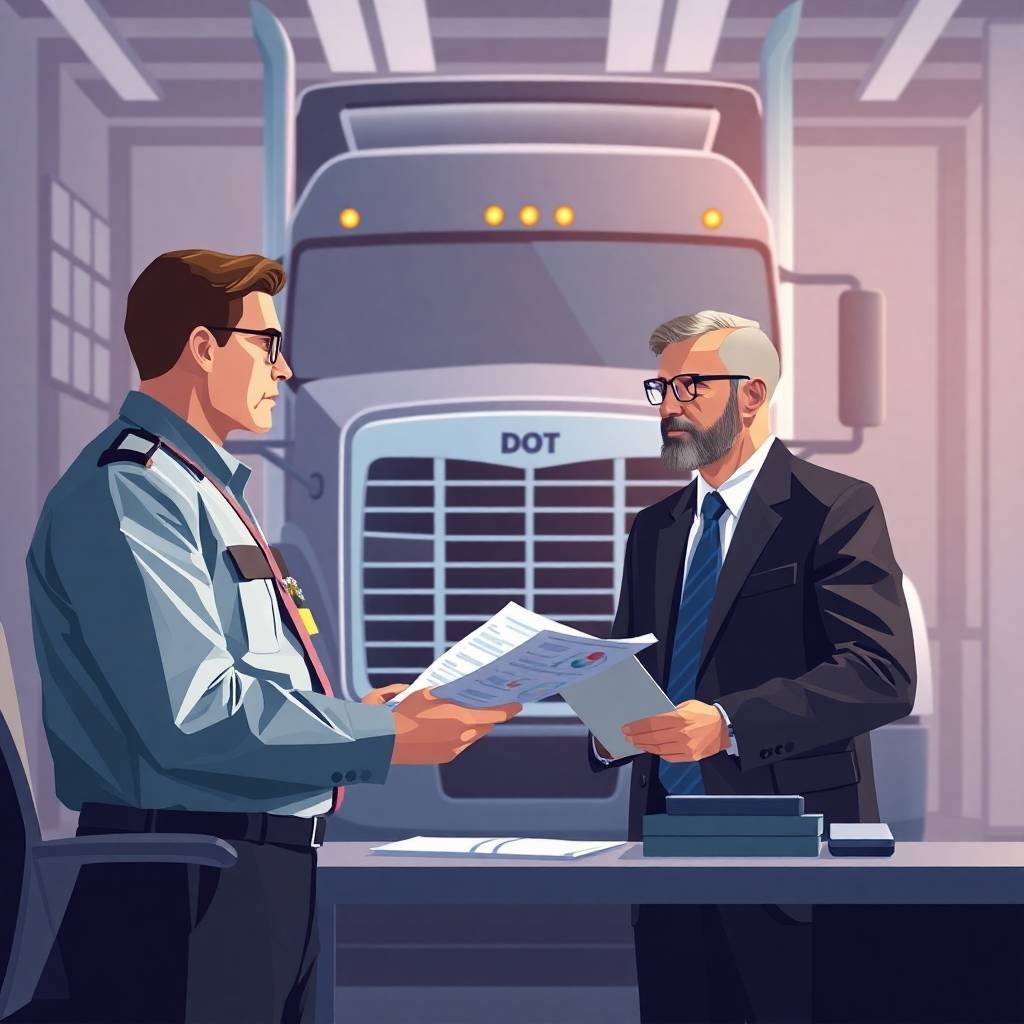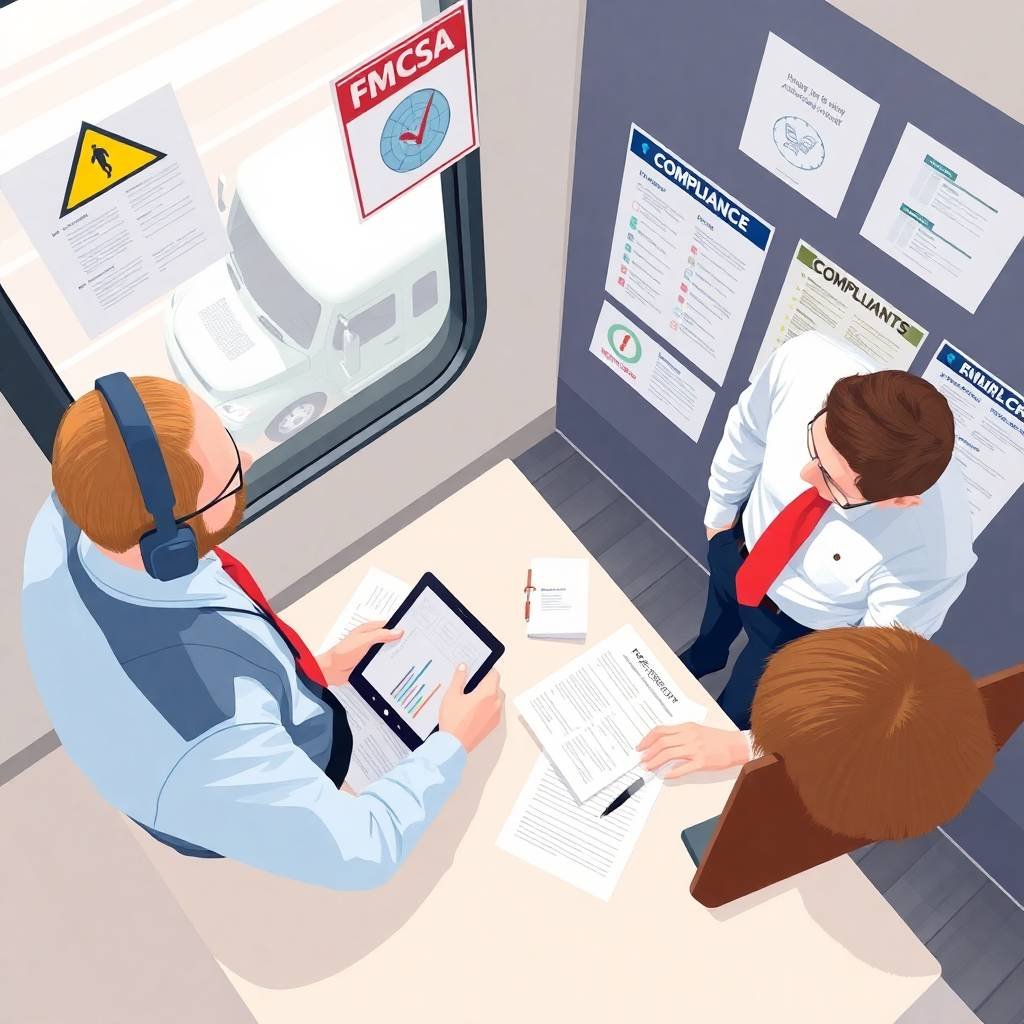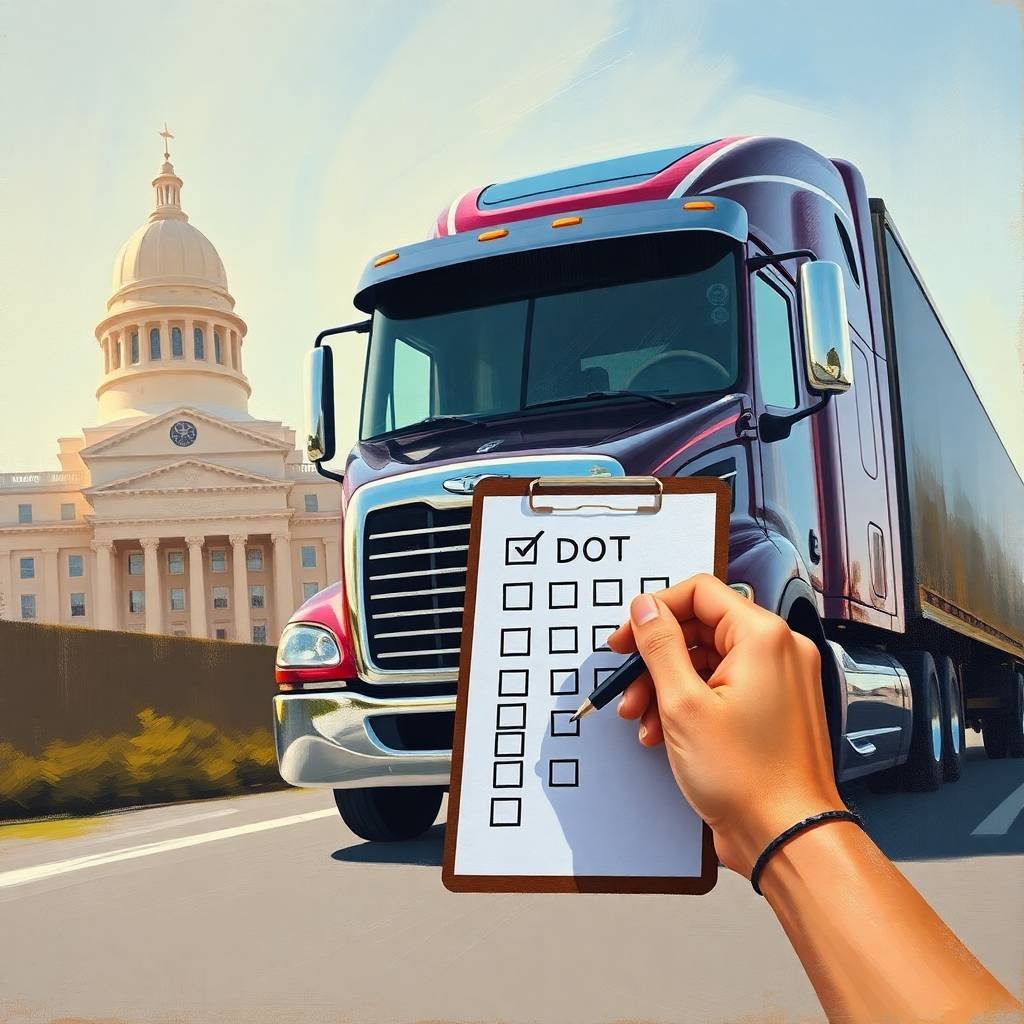1. Understand the Core Purpose of FMCSA Clearinghouse Compliance
In the ever-evolving landscape of commercial trucking regulations, FMCSA Clearinghouse Compliance has become a non-negotiable component of safe and legal fleet operations. As a federal initiative administered by the Federal Motor Carrier Safety Administration, the Clearinghouse is designed to improve road safety by providing employers, the FMCSA, State Driver Licensing Agencies, and law enforcement officials with real-time access to drug and alcohol program violations.
What Is FMCSA Clearinghouse Compliance?
FMCSA Clearinghouse Compliance refers to the process by which motor carriers, drivers, and service agents adhere to the regulations set forth in the Clearinghouse rule, which became effective in January 2020. At its core, it mandates that all CDL drivers and their employers report, manage, and query drug and alcohol testing records through the online Clearinghouse database. This allows for better visibility and accountability, especially when drivers move between employers or across state lines.
For those just beginning the compliance journey, our DOT Audit Preparation guide provides essential steps to ensure your company is audit-ready.
Why Is It Important?
The FMCSA Clearinghouse Compliance system aims to prevent drivers with unresolved drug or alcohol violations from operating commercial vehicles. This contributes to a safer highway system and protects carriers from liability risks. Non-compliance, on the other hand, can lead to serious consequences, including fines, audits, and loss of operating authority.
To stay ahead, visit Truckers Compliance Hub for expert updates and new posts on regulatory developments.
Who Must Comply?
All CDL drivers, employers of CDL drivers, and service agents such as Medical Review Officers and Substance Abuse Professionals are required to register and comply. Our Driver Qualification File Requirements post offers in-depth insights into maintaining compliant driver records in tandem with Clearinghouse obligations.
How to Maintain Compliance
Key responsibilities under FMCSA Clearinghouse Compliance include pre-employment queries, annual queries, and the prompt reporting of any violations. For assistance with DQ file setup and monitoring, consider partnering with professionals who understand the full scope of compliance.
Additional essential components include Drug and Alcohol Testing Management, which must be properly coordinated and documented, as well as support services like IFTA, IRP, and BOC-3 filing and UCR Filing Assistance.
Common Mistakes to Avoid
Missteps in FMCSA Clearinghouse Compliance are surprisingly common. Failing to perform annual queries or report violations promptly are two of the biggest pitfalls. Learn more by reading our article on FMCSA compliance mistakes, where we break down real-world examples.
Prepare for 2025
With new enforcement strategies rolling out through federal initiatives visible at Transportation.gov and WhiteHouse.gov, it’s crucial to get ahead of policy shifts. Our comprehensive DOT Audit Preparation for 2025 ensures you’re ready for what’s next.
Explore our updated FMCSA SMS 2025 guide and review the DOT Compliance Checklist for ongoing guidance.
Take the Next Step
Compliance doesn’t have to be overwhelming. If you’re ready to streamline your approach to FMCSA Clearinghouse Compliance, schedule your appointment today for a personalized consultation.

2. Master Registration Requirements for Employers and Drivers
Understanding the FMCSA Clearinghouse Compliance process is essential for any commercial driver or motor carrier operating under Department of Transportation (DOT) regulations. The FMCSA Drug and Alcohol Clearinghouse is a secure online database that gives employers, the FMCSA, State Driver Licensing Agencies (SDLAs), and law enforcement real-time access to drug and alcohol program violations for commercial drivers.
This article focuses on mastering the registration requirements for both employers and drivers — the first step toward maintaining full FMCSA Clearinghouse Compliance.
Why FMCSA Clearinghouse Compliance Starts With Registration
Registration is mandatory. Without proper registration, employers cannot run queries or report violations, and drivers cannot view or contest data in the Clearinghouse. The Federal Motor Carrier Safety Administration (FMCSA) mandates that all CDL drivers and employers register and participate in the Clearinghouse, reinforcing a national effort to reduce impaired driving and enhance road safety.
Agencies like Transportation.gov and WhiteHouse.gov underscore the importance of national safety compliance, with FMCSA Clearinghouse Compliance being a key pillar of these initiatives.
Registration Requirements for Employers
Employers — including owner-operators — must register on the Clearinghouse portal and designate their consortium/third-party administrator (C/TPA) if they use one. This designation is especially important for employers who manage their Drug and Alcohol Testing Management via a service provider.
After registering, employers are required to:
- Conduct pre-employment queries on all prospective CDL drivers.
- Run annual queries for current employees.
- Report violations promptly.
Ensure you’re audit-ready by reviewing our detailed DOT Audit Preparation guide, and avoid common pitfalls by reading about FMCSA compliance mistakes.
Driver Registration Essentials
For drivers, registering with the Clearinghouse is necessary to:
- Provide electronic consent for pre-employment queries.
- Review information on any reported drug or alcohol violations.
- Begin the return-to-duty process if required.
Drivers can follow our Driver Qualification File Requirements to make sure all supporting compliance records are current.
Managing Compliance Long-Term
Registration is only the beginning of FMCSA Clearinghouse Compliance. Long-term compliance requires consistent attention to regulatory changes, document monitoring, and proper filing of reports such as UCR, IFTA, IRP, and BOC-3.
Our comprehensive DQ file setup and monitoring service ensures that your company stays aligned with current DOT and FMCSA regulations.
To keep up with industry changes and expert tips, visit Truckers Compliance Hub and read timely insights like our DOT Audit Preparation for 2025 and FMCSA SMS 2025 guide.
Stay Ahead of Compliance Challenges
Avoid penalties by following our DOT Compliance Checklist, which is designed to help employers and drivers meet every requirement tied to FMCSA Clearinghouse Compliance. If you need personalized assistance, schedule your appointment for expert help with registration and ongoing compliance strategies.
3. Know Your Reporting Obligations Inside and Out
FMCSA Clearinghouse Compliance isn’t just about registration—it’s about proactive, timely, and accurate reporting. Every motor carrier, owner-operator, and consortium/third-party administrator (C/TPA) must fully understand their reporting obligations to remain compliant and avoid costly penalties.
The Federal Motor Carrier Safety Administration (FMCSA) requires that certain violations and actions be reported to the Drug and Alcohol Clearinghouse. This includes both positive drug and alcohol tests and refusals to test. Mastering this responsibility is essential for employers and service agents aiming for complete FMCSA Clearinghouse Compliance.
The Importance of Timely Reporting
The Clearinghouse is designed to ensure safety and accountability in the transportation industry by making driver drug and alcohol violations visible to employers, licensing authorities, and law enforcement. According to Transportation.gov, transparent data reporting enhances roadway safety and national policy enforcement. Furthermore, WhiteHouse.gov emphasizes ongoing federal oversight of safety-critical sectors like commercial transport.
Failing to report within the mandated timeframes is one of the most common FMCSA compliance mistakes. These errors can trigger DOT audits, which is why we recommend revisiting your DOT Audit Preparation process regularly.
What Must Be Reported?
To stay on track with FMCSA Clearinghouse Compliance, employers and C/TPAs must report:
- Positive drug or alcohol test results
- Refusals to test
- Actual knowledge of drug or alcohol use while on duty
- Completion of return-to-duty processes
- Negative return-to-duty test results
- Follow-up testing plans and results
Each of these components plays a vital role in the compliance lifecycle. For an in-depth understanding of testing and monitoring, review our Drug and Alcohol Testing Management service overview.
Driver Obligations
Drivers also play a crucial role in maintaining compliance. They are responsible for responding to query requests and initiating return-to-duty steps if violations occur. Our Driver Qualification File Requirements post details how drivers can ensure their records remain up to date and complete.
Ongoing Monitoring and File Maintenance
Meeting FMCSA Clearinghouse Compliance means employers must also conduct annual queries for all active CDL drivers. Utilizing services like our DQ File Setup and Monitoring ensures compliance is not a one-time event, but a continuous practice.
Additionally, proper handling of UCR filings and documentation such as IFTA, IRP, and BOC-3 supports full regulatory alignment beyond the Clearinghouse.
Stay Informed and Avoid Pitfalls
FMCSA enforcement evolves each year. Stay updated with content like our FMCSA Safety Measurement System SMS 2025 and DOT Audit Preparation 2025. Bookmark our main hub to view the latest and previous posts.
To make sure your company is meeting all FMCSA Clearinghouse Compliance requirements, start with our DOT Compliance Checklist. For personalized guidance, schedule your appointment with a compliance expert today.

4. Conduct Pre-Employment Queries the Right Way
One of the most essential steps in FMCSA Clearinghouse Compliance is conducting pre-employment queries correctly. For motor carriers and owner-operators, hiring a driver without verifying their drug and alcohol history in the FMCSA Drug and Alcohol Clearinghouse can result in costly penalties and regulatory scrutiny.
The FMCSA mandates that all employers of CDL drivers perform a full query in the Clearinghouse before hiring. This ensures that a potential driver does not have unresolved drug or alcohol violations on record. As part of a robust DOT audit preparation plan, performing and documenting these queries is non-negotiable.
Understanding Full Queries in FMCSA Clearinghouse Compliance
A full query provides detailed information on any reported drug and alcohol violations in a driver’s history. To access this information, employers must obtain the driver’s electronic consent through the Clearinghouse system. This process ensures the driver is aware of the query and legally authorizes the employer to view their record.
Employers must register with the Clearinghouse, maintain an account, and purchase query plans. Neglecting this process is one of the most common FMCSA compliance mistakes and a red flag in DOT audits.
For help setting up your Clearinghouse account and managing queries, visit our DQ File Setup and Monitoring service page.
Consent, Timing, and Recordkeeping
For FMCSA Clearinghouse Compliance, timing is everything. A pre-employment query must be conducted before the driver performs any safety-sensitive functions, including driving a commercial motor vehicle.
Once completed, the results must be documented and securely stored. These files, in addition to Driver Qualification File Requirements, form part of your mandatory compliance records. Proper documentation supports your defense during audits and helps meet DOT audit preparation 2025 requirements.
How Pre-Employment Queries Support Broader Compliance Goals
Ensuring FMCSA Clearinghouse Compliance is not just about one step—it’s about consistent and integrated safety practices. Pre-employment queries are your first line of defense against hiring high-risk drivers and violating federal mandates. As highlighted on Transportation.gov and WhiteHouse.gov, government oversight continues to tighten around carrier safety, making compliance more crucial than ever.
Incorporating Drug and Alcohol Testing Management and annual queries into your ongoing program ensures you’re meeting both initial and long-term obligations.
Build a Sustainable Compliance System
At Truckers Compliance Hub, we provide end-to-end support, from IFTA, IRP & BOC-3 filings to UCR Filing Assistance. Our goal is to help carriers meet FMCSA Clearinghouse Compliance standards seamlessly and confidently.
Explore our in-depth post on the FMCSA Safety Measurement System (SMS) 2025 and use our DOT Compliance Checklist to ensure nothing falls through the cracks.
Need Help? Schedule Your Compliance Consultation
Conducting pre-employment queries the right way is only one part of FMCSA Clearinghouse Compliance. To build a fully compliant operation, schedule your appointment with a compliance expert today. You can also visit our home page to browse the latest updates and resources.

5. Stay Ahead with Annual Limited Queries
Maintaining FMCSA Clearinghouse Compliance is not a one-time task—it’s an ongoing commitment. One of the most overlooked but critical aspects of compliance is conducting annual limited queries on all current CDL drivers. These queries are required by the Federal Motor Carrier Safety Administration to monitor ongoing drug and alcohol compliance and ensure your drivers remain eligible to operate.
If you’re a carrier, staying ahead with these annual limited queries is not optional—it’s essential. Missing just one driver in your fleet can result in hefty penalties and impact your FMCSA Safety Measurement System (SMS) 2025 scores.
What Are Annual Limited Queries?
Annual limited queries are a requirement under FMCSA Clearinghouse Compliance that allow employers to check if information exists in the Clearinghouse about a driver’s drug and alcohol violations, without accessing the full details. If a record is flagged, a full query with driver consent must then be conducted.
According to Transportation.gov, this routine monitoring enhances safety by preventing drivers with unresolved violations from slipping through the cracks. For streamlined implementation, explore our Drug and Alcohol Testing Management service, which integrates limited queries into your compliance program.
Why Annual Queries Are Non-Negotiable
From a regulatory perspective, annual queries form a foundational part of your FMCSA Clearinghouse Compliance strategy. They’re also key during DOT audit preparation—failure to conduct them on time or to maintain records is a red flag for auditors.
If you’re unclear about your responsibilities, review our DOT Audit Preparation 2025 guide or schedule a compliance consultation with our experts for step-by-step assistance.
Key Steps to Stay Ahead
- Register with the Clearinghouse: Employers must have an account to run queries.
- Purchase Query Plans: These are available through the FMCSA portal.
- Document All Results: Store outcomes in your Driver Qualification Files.
- Act on Flags Promptly: Any “hit” must be followed by a full query.
Our DQ File Setup and Monitoring service ensures every query and response is documented in compliance with federal standards.
Build a Comprehensive Compliance Strategy
Annual limited queries are just one pillar of a successful FMCSA Clearinghouse Compliance strategy. Carriers also need to manage UCR Filing Assistance, IFTA, IRP, and BOC-3 Support, and more.
Check out our FMCSA Compliance Mistakes post to avoid common pitfalls. You’ll also want to explore our DOT Compliance Checklist to ensure your operation is airtight.
Take Action Today
Whether you’re an owner-operator or manage a fleet, FMCSA Clearinghouse Compliance demands proactive effort. Keeping up with annual limited queries not only protects your business but also demonstrates your commitment to road safety—a priority echoed by WhiteHouse.gov.
To ensure you’re on the right track, visit Truckers Compliance Hub for the latest updates and resources or book your personalized consultation today..
6. FMCSA Clearinghouse Compliance: Avoid These Costly Mistakes
Since its launch, FMCSA Clearinghouse Compliance has been a cornerstone of national transportation safety policy, ensuring employers and drivers are held accountable for drug and alcohol violations. However, despite its importance, many carriers continue to make avoidable mistakes that can result in fines, revoked operating authority, or even disqualification from service.
If you’re a motor carrier or owner-operator, understanding the most common compliance pitfalls is essential to maintaining your business. Let’s explore these errors—and how to avoid them—while strengthening your overall compliance program.
1. Failing to Register Properly
The first and most fundamental mistake is neglecting to register in the Clearinghouse. Every employer of CDL drivers is required by the Federal Motor Carrier Safety Administration to register. Without registration, you cannot perform required queries or report violations, leading to automatic non-compliance.
Need assistance registering or managing your compliance portal? Our team at Truckers Compliance Hub can guide you through setup, or book a consultation for one-on-one support.
2. Ignoring Pre-Employment and Annual Queries
Another major compliance misstep is skipping pre-employment queries or forgetting annual limited queries. These are non-negotiable under FMCSA Clearinghouse Compliance rules. Failing to conduct these queries, or neglecting to document them properly, puts your business at risk.
Our DQ File Setup and Monitoring service ensures that every required document—including query history—is properly filed and maintained.
3. Not Reporting Violations Timely
Employers are required to report any drug or alcohol violations promptly. Delayed or missed reporting is a red flag during DOT audit preparation and can result in citations.
We’ve broken this down further in our past post on FMCSA Compliance Mistakes, a must-read if you’re looking to tighten your procedures.
4. Mismanaging Return-to-Duty Status
Employers must also verify that drivers who test positive complete the return-to-duty (RTD) process through a Substance Abuse Professional (SAP). If you fail to confirm completion and prematurely allow a driver back on the road, your FMCSA Clearinghouse Compliance is compromised.
For step-by-step assistance with RTD protocol, visit our Drug and Alcohol Testing Management page.
5. Overlooking the Big Picture
FMCSA Clearinghouse Compliance is only one aspect of a broader compliance ecosystem. From UCR Filing Assistance and IFTA, IRP, BOC-3 Support to ongoing monitoring, it’s critical to implement a comprehensive compliance strategy.
The DOT Compliance Checklist can serve as a baseline for your ongoing compliance management efforts.
Stay Proactive, Not Reactive
Whether you’re preparing for the 2025 DOT Audit or looking to avoid slipping SMS scores outlined in our FMCSA Safety Measurement System (SMS) 2025 article, staying proactive with FMCSA Clearinghouse Compliance is your safest bet.
Explore policy context via Transportation.gov or national legislative updates at WhiteHouse.gov.
For expert guidance, visit Truckers Compliance Hub or schedule your appointment now to ensure you’re on track and audit-ready.

7. Train Your Team on DOT Drug and Alcohol Testing Procedures
For employers in the commercial motor carrier industry, ensuring your team understands and follows proper DOT drug and alcohol testing procedures is not optional—it’s federally mandated. The FMCSA Clearinghouse Compliance framework is central to ensuring driver safety, employer accountability, and long-term operational success.
When your staff is fully trained on these procedures, your company is far less likely to face penalties, disqualifications, or failed audits. Below, we cover what employers must do to train teams effectively and maintain airtight FMCSA Clearinghouse Compliance.
Why Drug and Alcohol Testing Procedures Matter
The Federal Motor Carrier Safety Administration (FMCSA) created the Clearinghouse to prevent drug- and alcohol-impaired drivers from operating commercial motor vehicles. It’s part of a larger mission supported by resources from the U.S. Department of Transportation and WhiteHouse.gov to uphold safety on our highways.
Properly training your team on FMCSA Clearinghouse Compliance ensures your company meets regulations around pre-employment testing, random tests, post-accident procedures, return-to-duty protocols, and more.
If you’re unsure where your team stands, visit Truckers Compliance Hub or schedule a 30-minute consultation to assess your current training protocols.
Start with the Basics: What Must Be Covered?
To maintain FMCSA Clearinghouse Compliance, your training should include:
- Pre-employment drug testing
- Random alcohol and drug testing
- Post-accident testing timelines
- Reasonable suspicion protocols
- Return-to-duty and follow-up procedures
Our Drug and Alcohol Testing Management service can help you build a compliant, clear policy that your employees can understand and follow.
Integrate Training into Hiring and HR Processes
It’s not enough to train drivers alone. HR departments, safety officers, and even dispatchers should understand how FMCSA Clearinghouse Compliance impacts their roles. This includes using the Driver Qualification File Setup and Monitoring process and ensuring timely reporting to the Clearinghouse.
To dig deeper into onboarding best practices, review our guide to Driver Qualification File Requirements.
Stay Audit-Ready at All Times
An untrained team increases your risk of non-compliance, which is especially dangerous during DOT audits. Investing in training helps you remain ready for both scheduled and surprise inspections.
We’ve outlined best practices in our DOT Audit Preparation and DOT Audit Preparation 2025 articles.
Avoid Common Mistakes
A poorly trained team may make costly compliance errors. Whether it’s failing to run queries, missing deadlines, or not reporting violations, mistakes are expensive. Explore our article on FMCSA Compliance Mistakes to learn from common pitfalls.
For comprehensive guidance, refer to our DOT Compliance Checklist and align your operations with the latest FMCSA standards.
Build Long-Term Compliance Confidence
Training isn’t a one-time event—it’s an ongoing process that should evolve with changing regulations. Pair it with services like UCR Filing Assistance and IFTA, IRP & BOC-3 Support for end-to-end coverage.
Your commitment to FMCSA Clearinghouse Compliance will pay off in fewer violations, safer roads, and a stronger company reputation. Visit Truckers Compliance Hub to access more articles, or book your consultation today to strengthen your team’s compliance knowledge.
8. Use Technology to Simplify FMCSA Clearinghouse Compliance
Staying current with FMCSA Clearinghouse Compliance regulations can be a daunting task, especially for motor carriers juggling safety audits, driver onboarding, and federal mandates. But in today’s fast-paced transportation industry, using technology isn’t just helpful—it’s essential.
With increasing regulatory oversight from organizations like the Federal Motor Carrier Safety Administration, Department of Transportation, and even influence from broader policy at WhiteHouse.gov, the margin for error in compliance is shrinking. Fortunately, the right tech tools can make managing FMCSA Clearinghouse Compliance easier, more accurate, and significantly less stressful.
Automate Query Management and Reporting
A major component of FMCSA Clearinghouse Compliance involves conducting required queries—pre-employment and annual limited checks—to ensure drivers do not have violations in the Drug & Alcohol Clearinghouse. Manual processes often lead to errors, missed deadlines, or incomplete reports.
With tools like digital dashboards and automated alerts, you can simplify query tracking and compliance reporting. You can also rely on our Drug and Alcohol Testing Management solutions to ensure you never miss a reporting obligation. These systems help companies remain compliant without the guesswork.
Streamline Driver Qualification and File Management
Technology can take the guesswork out of managing Driver Qualification Files. Digital platforms help centralize documentation, monitor expiration dates, and provide real-time updates. This is key to maintaining FMCSA Clearinghouse Compliance in tandem with your overall safety and personnel records.
Our DQ File Setup and Monitoring services help carriers integrate technology into their compliance strategy for better organization and fewer violations.
Stay Prepared for Audits with Digital Recordkeeping
DOT audits are becoming more data-driven. Having a centralized, digital recordkeeping system gives carriers a clear advantage when auditors request records. Our DOT Audit Preparation and 2025 Audit Prep Guide outline how digital tools reduce audit stress and streamline compliance documentation.
To dive deeper, check out our detailed DOT Compliance Checklist, which breaks down essential records and timelines.
Sync UCR, IFTA, IRP, and BOC-3 Support in One Place
Managing UCR filings, IFTA, IRP, and BOC-3 forms manually across different platforms invites unnecessary errors. Integrated compliance software can sync these services, reducing administrative burdens and reinforcing FMCSA Clearinghouse Compliance across departments.
Avoid Costly Mistakes with Centralized Oversight
Without tech integration, companies often fall into compliance traps. Our post on FMCSA Compliance Mistakes highlights common errors that technology can help eliminate—like failing to report violations or missing random test deadlines.
Use our tools and insights from the FMCSA SMS 2025 guide to evaluate your safety metrics and compliance exposure.
Ready to Simplify Compliance? Let’s Talk
Whether you’re new to FMCSA Clearinghouse Compliance or looking to upgrade your current approach, integrating technology is the smartest step forward. Visit Truckers Compliance Hub to explore more resources, or schedule a consultation to see how we can help simplify your compliance strategy with smart tools.

9. Keep Records Secure and Audit-Ready
For motor carriers, staying ahead in the transportation industry means more than delivering freight on time—it requires airtight recordkeeping that ensures FMCSA Clearinghouse Compliance. Regulatory agencies like the FMCSA, Department of Transportation, and even initiatives backed by WhiteHouse.gov continue to prioritize transparency, safety, and compliance. This puts a spotlight on how companies store, manage, and access their records.
If your files are scattered or disorganized, you risk failing a DOT audit or facing penalties for non-compliance. At Truckers Compliance Hub, we work with carriers to implement smart recordkeeping strategies that keep operations secure and audit-ready year-round.
The Role of Recordkeeping in FMCSA Clearinghouse Compliance
One of the foundational pillars of FMCSA Clearinghouse Compliance is maintaining secure, accurate, and accessible records. From pre-employment queries to random drug and alcohol test results, these documents must be retained for set durations and made available upon request.
Whether you’re tracking consent forms, test results, or annual limited queries, our Drug and Alcohol Testing Management solutions help you organize the essentials. Proper documentation ensures that you meet all federal mandates and avoid common violations.
Digitize and Centralize Your Records
Manual filing systems are not only outdated but also risky when it comes to FMCSA Clearinghouse Compliance. Centralized digital platforms offer a smarter alternative. These systems provide real-time access, document backups, and role-based permissions, which limit unauthorized access to sensitive data.
Our DQ File Setup and Monitoring services help clients transition to a digital environment—making your Driver Qualification Files easier to manage and audit.
Be Audit-Ready Every Day
DOT audits can occur unexpectedly, which means preparation is not a one-time task. With the help of our DOT Audit Preparation experts, you can maintain audit-ready files year-round. Our detailed 2025 Audit Prep Guide outlines exactly what to expect during compliance reviews.
Additionally, our DOT Compliance Checklist can help you assess and plug any gaps in your recordkeeping strategy.
Integrate UCR, IFTA, IRP, and BOC-3 Documentation
To achieve full FMCSA Clearinghouse Compliance, your back office must also include timely filings for UCR, IFTA, IRP, and BOC-3 documentation. Technology can simplify the process and ensure that each record is properly stored and updated.
Avoid Common Mistakes with Secure Recordkeeping
Failure to secure records or produce them during audits can lead to steep fines and operational delays. We’ve outlined some of the most common pitfalls in this post on FMCSA compliance mistakes. Learning from these can help you build a proactive compliance strategy.
Let’s Secure Your Records and Your Future
To meet the rising demands of FMCSA Clearinghouse Compliance, it’s time to modernize your approach to recordkeeping. Visit Truckers Compliance Hub for more compliance tools and insights, or book a personalized consultation to get tailored support for your fleet’s needs.
10. Stay Updated with Regulatory Changes and Industry Alerts
In today’s fast-evolving transportation environment, FMCSA Clearinghouse Compliance is not a one-time obligation—it’s a continuous process. Carriers and fleet managers must stay on top of ongoing regulatory changes and industry alerts to avoid costly violations, protect their operating authority, and ensure safety across their operations.
Monitoring updates from the Federal Motor Carrier Safety Administration (FMCSA), Department of Transportation, and broader federal initiatives via WhiteHouse.gov is critical for maintaining full FMCSA Clearinghouse Compliance. Whether you’re managing pre-employment queries, drug and alcohol test results, or driver qualification files, staying updated helps you avoid missteps that could result in penalties or audits.
Why Staying Current Matters for FMCSA Clearinghouse Compliance
Changes in federal transportation regulations can impact everything from how you conduct random testing to how long you retain records. A single overlooked alert can lead to non-compliance. For example, the FMCSA may update reporting thresholds or testing protocols that affect your drug and alcohol testing program.
Frequent review of your Driver Qualification File Requirements also ensures your files remain compliant with updated mandates—a key piece in avoiding issues during DOT audits.
Track Alerts with the Right Resources
To maintain FMCSA Clearinghouse Compliance, you must utilize reliable resources. Regularly checking the FMCSA’s website and subscribing to government transportation bulletins ensures you’re never blindsided by policy shifts.
You can also stay informed by visiting Truckers Compliance Hub, where we share critical updates, tips, and strategies in real-time. We also provide in-depth breakdowns in our popular posts like FMCSA Compliance Mistakes and the FMCSA SMS 2025 Guide.
Keep Your Files and Processes Aligned with Changes
It’s not enough to know about changes—you need to apply them across your compliance protocols. For example, updates to DQ file standards must be reflected in your DQ File Setup and Monitoring process. Similarly, shifts in audit criteria should trigger a review of your DOT Audit Preparation checklist and the newer 2025 preparation guide.
As new mandates take effect, reviewing your UCR, IRP, IFTA, and BOC-3 records is also critical. Our IFTA, IRP, and BOC-3 Support and UCR Filing Assistance services are designed to ensure all filings reflect the latest requirements.
Build a Proactive Compliance Culture
Empower your compliance team to adopt a proactive mindset. Encourage regular reviews using our DOT Compliance Checklist, and integrate alerts into your company’s operational routine.
To truly streamline your compliance process, consider scheduling a strategy session with one of our FMCSA experts. We’ll review your protocols and help you close any gaps.
Final Thoughts
FMCSA regulations evolve constantly, and failing to adapt can result in steep fines or disrupted operations. Staying informed is a core element of FMCSA Clearinghouse Compliance, and leveraging expert resources is the smartest way to keep your fleet safe and compliant.
Bookmark Truckers Compliance Hub to stay ahead of regulatory changes—and make compliance your competitive advantage.
What is FMCSA Clearinghouse Compliance and why is it important?

FMCSA Clearinghouse Compliance ensures that employers, drivers, and service agents adhere to federal regulations regarding drug and alcohol testing in the commercial trucking industry. Compliance helps maintain road safety and protects companies from costly penalties and liability. For a comprehensive approach that includes drug and alcohol testing management, visit Truckers Compliance Hub’s Drug and Alcohol Testing Management service.
How often should employers conduct Clearinghouse queries?

Employers must run a full query during pre-employment and limited queries annually for all CDL drivers to remain in FMCSA Clearinghouse Compliance. Failing to do so can result in serious violations. If you need help tracking compliance documents or monitoring query schedules, check out Truckers Compliance Hub’s DQ File Setup and Monitoring support.
What records are required for FMCSA Clearinghouse Compliance audits?

For proper FMCSA Clearinghouse Compliance, employers must maintain documentation of query consent, query history, violation reports, and driver resolution steps. Staying audit-ready is critical. To make audit preparation seamless, see Truckers Compliance Hub’s DOT Audit Preparation services.
Who is required to register in the FMCSA Clearinghouse?

All CDL drivers, employers of CDL drivers, consortia/third-party administrators (C/TPAs), and medical review officers (MROs) must register to meet FMCSA Clearinghouse Compliance rules. If your business also needs help managing other federal compliance filings like UCR or BOC-3, visit Truckers Compliance Hub’s UCR Filing Assistance and IFTA, IRP & BOC-3 Support.
What happens if a driver has a violation in the FMCSA Clearinghouse?

Drivers with a violation must complete the return-to-duty process, including evaluation and follow-up testing, before they can resume safety-sensitive functions. Employers must ensure no driver performs such functions without proper clearance to maintain FMCSA Clearinghouse Compliance. For help managing this process efficiently, visit Truckers Compliance Hub’s Drug and Alcohol Testing Management.
Igor Iturriaga is a transportation compliance expert and founder of Dynamic 305 Miami LLC. He helps owner-operators and fleets stay FMCSA-compliant and audit-ready. https://www.linkedin.com/in/igor-iturriaga-64503217/
